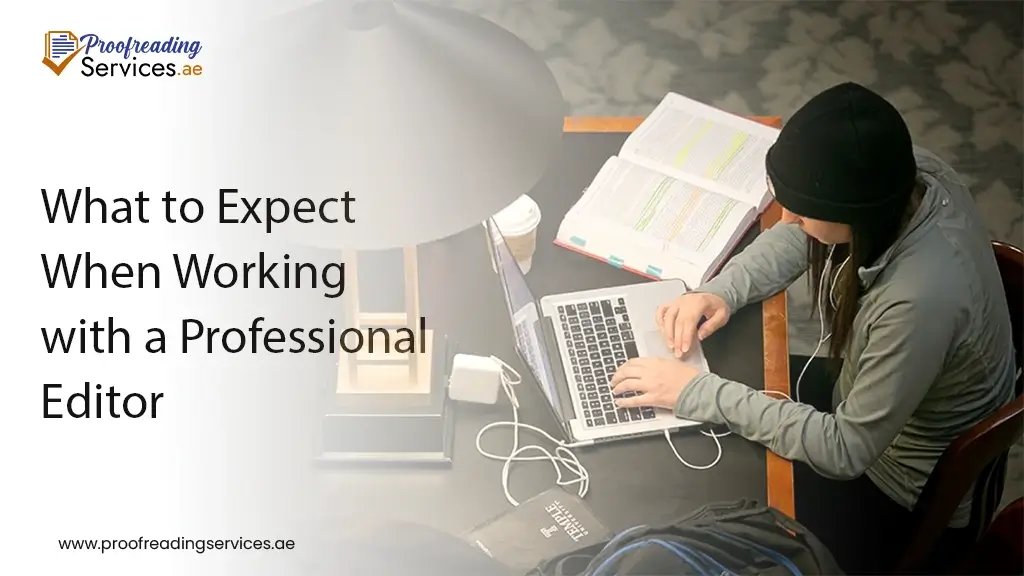So, you have completed the manuscript writing process, which is great work. But now comes an important step: editing by a professional editor. So, no matter if you are working on a novel, an article, or anything that requires writing, it can be helpful to hire a professional editor. In this blog, we want to lead you through what will happen when you decide to collaborate with an expert compiler. If you happen to be in the UAE and want to know what it is like to deal with a competent editing firm, this guide will also explain how it is to work with Expert Editors in the UAE.
1. Understand the Role of a Professional Editor
Definition and Responsibilities
- Now, let us first find out what professional compilers are. You can think of them as a tutor who takes your work and makes it the best that it can be. They make sure to proofread it so that your writing is clear when read out loud, that there are no jumps in the middle of the text, and finally that there are no errors. In general, there are several levels of editing, and each level aims at a particular goal.
- Proofreading: This is the final check to see if there are any errors, like typos or misplaced commas.
- Copyediting: So, the professional compiler fixes grammar mistakes when he does copyediting. In other words, he checks for consistency and makes sure your writing follows the right style.
- Substantive Editing: Here, the compiler looks at your content as a whole and helps with things like structure, pacing, and making sure your arguments make sense.
Why You Need an Editor
You can do this all yourself. However, having a professional compiler review the manuscript brings a completely different perspective and years of experience. They help you in making your written content more understandable and interesting, which would be great for your readers. So, if you are based in the UAE and require professional assistance, then Expert Editors UAE can offer the best editing services for your texts.
2. Prepare for the Editing Process
Initial Preparation
When you approach a professional compiler and he opens your manuscript, the first thing you will hear from him are impressions. They will perform a survey of simpler and larger problems such as whether the content is easily organized and whether there are large gaps in it.
Setting Goals and Expectations
Talk to your professional compiler about what you want from the editing process. Therefore, set clear goals and agree on deadlines so that both you and your compiler are on the same page.
3. The Editing Process
Initial Assessment
When the professional compiler first looks at your manuscript, they will give you their first impressions. They will check for major issues like how well the content is organized and if there are any gaps in the information.
Types of Edits
- Developmental Editing: This type focuses on improving the structure and content of your manuscript. Your compiler will help you organize your ideas and ensure everything flows smoothly.
- Copyediting: Here, the compiler dives into the details—correcting grammar, checking for consistency, and making sure your writing style is clear and correct.
- Proofreading: This is the final stage where the compiler looks for small errors like typos, punctuation mistakes, and formatting issues.
Feedback and Revisions
When your compiler has edited the document, he or she will provide feedback to you. This usually comes in the form of scribbled comments or annotations on your own document probably in the track changes section. You then go through the changes that they recommend and you make any alterations if needed. It is quite an exchange, but it’s a process of fine tuning for your manuscript, of making it as good as it can be.
4. Communicating with Your Editor
Effective Communication
Your professional compiler is there to help, so keeping an open line of communication will make the process smoother.
Collaborative Approach
Remember, editing is a team effort. While your editor brings their expertise, your input is also important. Work together to make sure the final product reflects your vision while benefiting from the editor’s professional touch.
5. Managing the Editorial Timeline
Typical Timelines
Editing takes time, and the length of time can vary depending on your manuscript’s length and complexity. For example, a short article might only take a few days, while a full-length novel could take weeks. It’s helpful to discuss timelines with your professional compiler so you know what to expect.
Handling Delays
Sometimes, things don’t go as planned. If there are delays, don’t stress. Just stay in touch with your professional editor and work out a new timeline if needed.
Conclusion
So that is the whole idea! Getting back to the first step though, hiring a professional compiler might sound somewhat intimidating initially and yet it is an important step in preparing a good material. So, if you’re based in the UAE, these professional compilers could provide you with the assistance you require in order to ‘polish’ your manuscript. Understand the workflow, explain it to them frankly, and prepare for the fact that your work will be refined to the finest.
